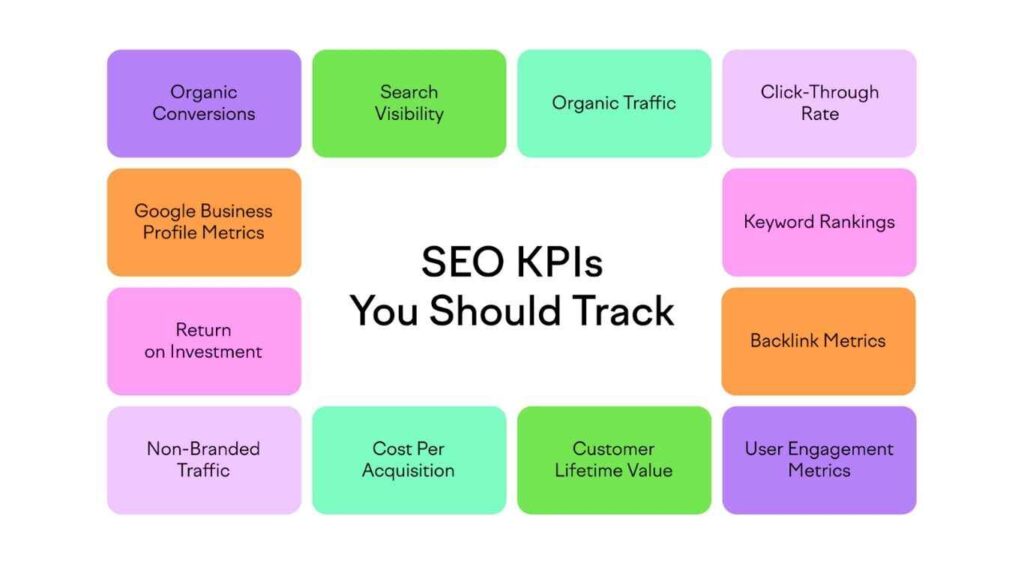When it comes to improving your website’s visibility and ranking, SEO metrics serve as a roadmap to success. They help you see what’s going well, what needs fixing, and how your website appears in search results. By tracking these numbers, you can make smarter decisions instead of relying on guesswork.
Whether you are managing a small personal blog or handling a large enterprise website, understanding the right SEO metrics helps you stay on the right path. These insights help you understand your audience’s behavior, refine your content strategy and optimize your site for search engines. Knowing your SEO metrics is the first step toward building steady, long-term online growth.
What Are SEO Metrics?
SEO metrics are measurable data that help you understand how well your website is optimized for search engines. They allow you to track visibility, user engagement, technical performance, and overall organic growth.
SEO metrics allow you to measure SEO performance and make data-driven decisions instead of guessing what might work.
Why Metrics Matter in SEO
Without tracking metrics, SEO becomes a shot in the dark. You might publish great content, but without numbers to back it up, you can not tell whether it is bringing value.
By monitoring the best metrics for website SEO, you can identify:
- Which pages drive the most organic traffic
- What keywords bring in visitors
- How users behave after landing on your site
- Where technical or content issues exist
This insight helps you adjust strategies quickly and keep your site competitive.
Key Metrics for SEO Success
Let’s explore some of the most essential metrics for SEO basics you should monitor regularly:
Organic Traffic
Organic traffic is one of the most basic yet powerful SEO metrics. It shows how many users visit your site from search engines. Use Google Analytics or Google Search Console to see which pages are driving the most visits.
Keyword Rankings
Tracking keyword positions helps you understand how well your pages are performing for specific search terms, including long-tail keywords, short-tail keywords, and LSI keywords. Rising rankings across these keyword types usually indicate that your SEO strategy is moving in the right direction.
Click-Through Rate (CTR)
CTR measures how often people click your website link after seeing it in search results. A low CTR might mean your titles or meta descriptions need improvement.
Bounce Rate
Bounce rate tells you how many visitors leave your site after viewing only one page. A high bounce rate can indicate that your content isn’t engaging or relevant enough to the audience.
Clarity of Google Search Operators
Google search operators help make your searches clearer and more accurate. They make it easier to find exactly what you’re looking for without digging through a bunch of unrelated results.
Average Session Duration
It shows how long visitors stay on your website. Longer sessions often suggest that your content is interesting and valuable.
Pages per Session
This metric helps determine how deeply users explore your site. If visitors view multiple pages, it is a sign of good navigation and engaging content.
Backlinks
Backlinks from reputable sites are a strong ranking signal. Tracking your backlink growth is essential for measuring SEO performance and building domain authority.
Page Speed and Core Web Vitals
Technical performance is part of modern SEO. Google considers Core Web Vitals, including loading speed, interactivity, and visual stability.
Enterprise SEO Metrics
For broad websites, tracking enterprise SEO metrics becomes even more critical. Large-scale sites have thousands of pages, multiple subdomains, and global traffic sources.
Important enterprise-level metrics include:
Crawl Efficiency
Measure how smoothly search engines navigate through your website. A well-structured site helps crawlers find and index your pages faster, improving visibility and ranking potential.
Index Coverage
Keep an eye on which pages are actually showing up in Google’s index. Every valuable page should be discoverable.
Content Performance by Category
Understand which sections of your site bring the most SEO value. Whether it is specific product lines or regional content, tracking performance by category helps you focus on what truly drives results.
Technical Health
Think of this as your website’s health check. Regularly monitor for duplicate content, broken links, slow-loading pages, or redirect loops that could hurt your rankings or user experience.
Best Metrics for Website SEO
If you are starting or managing a smaller site, focus on these best metrics for website SEO:
- Organic traffic
- Keyword rankings
- CTR (Click-through rate)
- Bounce rate
- Backlinks
These core metrics will help you build a strong SEO foundation and understand what content your audience values most.
Final Thoughts
Tracking SEO metrics is not just about numbers; it is about understanding how people find and interact with your website. The right SEO metrics give you a clear picture of progress and help refine your strategy over time.
Whether you are managing a personal blog or working on enterprise SEO metrics, consistent tracking ensures that every decision you make moves your website toward better visibility and traffic.
